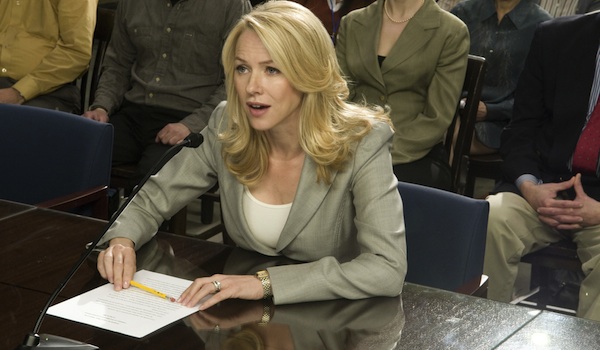Fair Game Review
Sometimes a film doesn’t need a unique look or style to succeed. Take Fair Game, director Doug Liman’s take on the Valerie Plame/Joe Wilson/Scooter Libby saga. His matter-of-fact approach to the material makes this a film I can see being easily written off, but it’s this very same approach that elevates it to such a high level. This is inherently compelling stuff—full of government intrigue, lies, corruption, personal strife, and a David vs. Goliath struggle—and it’s all smartly written and extremely well-acted. Fair Game might not be setting the box office on fire, and it might not be generating the same kind of Oscar buzz as other prestige films of the fall, but it’s all but assured a place on my end-of-year top 10 list.
In the lead up to the Iraq War, Valerie Plame (Naomi Watts) was a vital figure in the U.S. intelligence community. Not only did she run covert CIA missions in hot spots like Jordan, Malaysia, and Pakistan, but she was also married to a man, Joe Wilson (Sean Penn), who headed a fact-finding mission to Niger. The goal of Wilson’s mission was to determine if the government of Niger had sold yellowcake uranium to Saddam and the Iraqis. His answer was an unequivocal, “No.†But the government didn’t seem to care for that answer. They found their justification for war in a shipment of metal tubes, which could maybe have been used for enriching uranium. Plame and her colleagues disagreed strongly, but continued on with their jobs, even with the office of Vice President Dick Cheney breathing down their necks. Wilson, however, isn’t one to take something like this lightly. He writes a searing column in The New York Times, and when the White House sees it, they declare war on Wilson. And their first strike is against his wife—they leaked her cover, unofficially ending her career and putting many of her contacts at risk.
The film shifts quite sharply at this point. It deals with the strain in Plame’s marriage as Wilson goes on the attack, and she deals with the situation privately. Neither portion of the film is “better†than the other. They both have their strengths and complement each other well. The lengthy set-up is necessary to not only make us understand the complex situation these individuals find themselves in, but also to make us sympathize with them. Neither Wilson nor Plame is “right†in the way they deal with their troubles. Some would want to tell Wilson to shut up, while others will want to tell Plame to stand up and speak up. But it’s because Liman develops them as individuals that we care what they do and what happens to them.
It also helps when you have two fantastic actors giving Oscar-worthy performances. We’ve come to expect work of this caliber every time Sean Penn appears on screen. Wilson, like Harvey Milk in Milk, is just a great character. He’s loud. He has a short temper. And he cares deeply about his family and won’t allow anyone, especially someone with nefarious intentions, to discredit her. Watts, on the other hand, has the tricky job of playing a strong woman who’s slowly being broken down by powers greater than herself. It’s an interesting role because usually when women appear in spy films, they are of the Angelina Jolie in Salt variety. This is a rare—but welcome—case of a spy drama with a female lead. But make no mistake, Watts has a lot to do. She is forced to convey a wide range of emotions. And she pulls it all off stunningly. I loved Jennifer Lawrence in Winter’s Bone and Annette Bening and Julianne Moore in The Kids Are All Right in 2010, and I think Watts is right on par with these women.
It’s Liman, though, who surprised me the most. This seems like a surprising project for the director of The Bourne Identity and Mr. and Mrs. Smith, and what’s even more surprising is that Liman resists the impulse to inject some potentially crowd-pleasing action into the proceedings. He keeps things talky and dramatic, which is fine. This just isn’t a story that needs embellishing, and the writing reflects that. Liman and the film’s screenwriters, Jez Butterworth and John-Henry Butterworth (who are adapting the memoirs of both Plame and Wilson), pepper the film with great, flowery dialogue and still manage to avoid losing sight of the dense plot and thoughtful character development.
I’ve said the film likely won’t garner all that much Oscar attention—the buzz is just a little too quiet right now. But I hope I’m wrong. This is the kind of film I think will grow on me even more with additional viewings because of it really walks a tightrope quite well. It’s a slow-burn political character study/underdog tale. Few, if any, other films can earn that label, and I doubt any of those are as well-made and as entertaining as Fair Game.
















